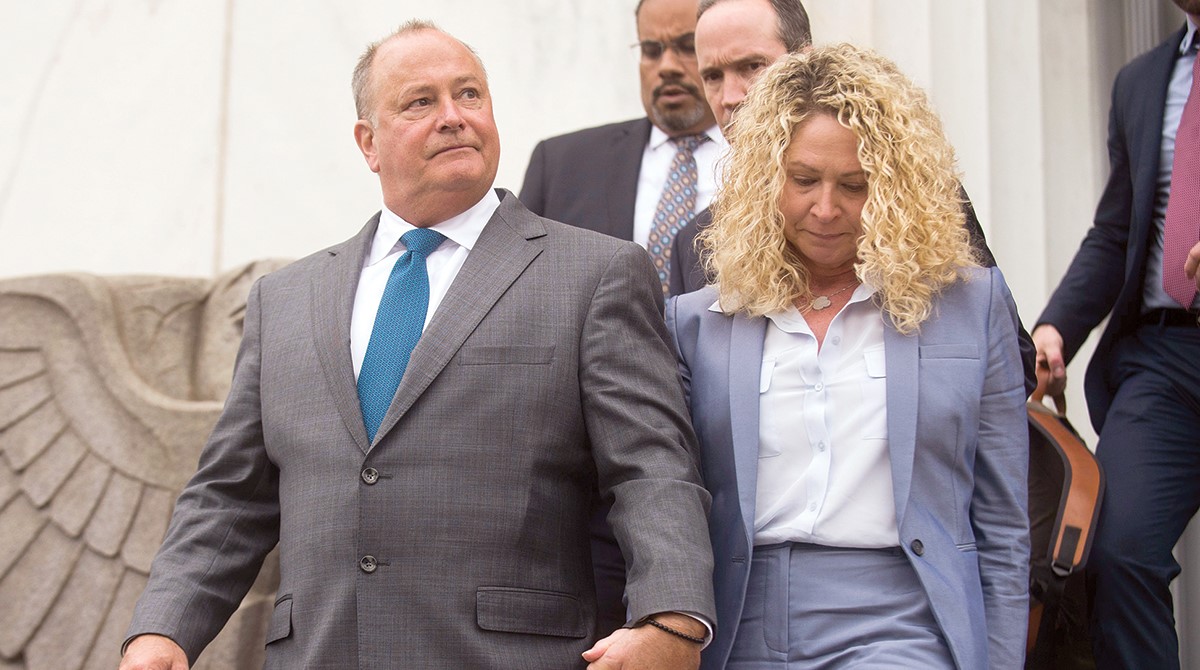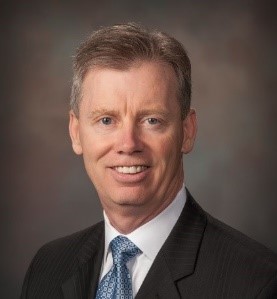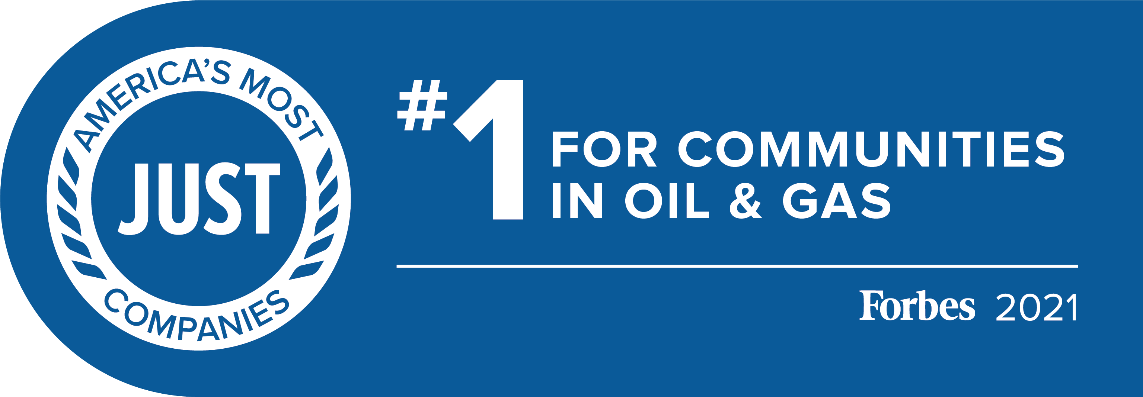Q1 2021 Integrity Advocate
Pilot Scandal Back in the News

Mark Hazelwood, former Pilot Flying J President, exited a federal courthouse with his wife, Joanne, in Chattanooga, TN on September 26, 2018. (Caitie McMekin/News Sentinel)
Former Pilot Flying J (“Pilot”) President, Mark Hazelwood, and two of his co-defendants, former Pilot sales executives Heather Jones and Scott Wombold, had their fraud convictions overturned by a federal appellate court on the grounds that a lower court allowed inadmissible evidence. The three were convicted in February 2018 in connection with a five-year scheme to grow Pilot’s market share by defrauding trucking companies.
The 6th U.S. Circuit Court of Appeals panel reversed the convictions in a 2 – 1 vote, remanding the case to the district court for a new trial. The appeals court said in its opinion, admitted recordings of Hazelwood using “deeply offensive racist and misogynistic language” on the theory that if he was, “reckless enough to use language that could risk public outrage against the company, he was a ‘bad businessman,’ and as a bad businessman, he was also reckless enough to commit fraud.”
According to the appeals court, the recordings were made undercover by Vince Greco, a member on the Pilot sales team, who agreed to cooperate with federal agents in the investigation leading to the charges in the case. “This is vintage bad character evidence and precisely the type of reasoning the Federal Rules of Evidence forbid,” the appellate court said. “The use of the audio recordings in this case jumped the rails of those rules.”
“First, none of the Rules of Evidence support the recordings’ admissibility,” the court said. “Second, and more importantly, even if somehow otherwise admissible, the recordings are a textbook violation of Rule 403, because the risk of unfair prejudice eviscerates any purported probative value.”
The lawsuit was filed by companies that declined to participate in an $85 million settlement between Pilot and 5,500 trucking companies in connection with the allegations that the company cheated customers out of discounts and rebates. The scheme was brought to light as a result of an April 2013 raid by the FBI and the Internal Revenue Service on the company’s Knoxville headquarters. Prior to the raid, a group of 14 Pilot sales executives and employees confessed to intentionally shortchanging trucking customers over a period of at least 5 years. In addition to the settlement, Pilot entered into a Criminal Enforcement Action with the government and agreed to pay a $92 million penalty.
Following the original convictions, Pilot was ready to move on from the scandal and regain the public’s trust. In addition to continued cooperation throughout the investigation, Pilot made extensive policy, procedure and staffing changes. However, news of the conviction reversals and potential for a new trial places Pilot and its sins of the past right back in the news.
ESG Scores Impacted by Scandal
What is ESG? ESG is an acronym for environmental, social and governance. The term, ESG, was coined in 2005 in a landmark study entitled “Who Cares Wins” by the UN Global Compact.[1] This study made the case that embedding ESG factors in capital markets makes good business sense and leads to more sustainable markets and better outcomes for societies.
Environmental factors consider a company's impact on the environment, social factors consider a company's impact on people, and governance factors consider the way a company is run.
ESG Score
Since “Who Cares Wins” was published in 2005, there has been a substantial amount of work on the business case for sustainability, and growing investor focus on ESG factors.
Data from Morningstar indicates an almost fourfold increase in new assets in U.S.-bought ESG funds from 2018 ($5.5 billion) to 2019 ($20.6 billion).[2] This is great for companies that possess strong ESG scores, but for those who have been put in the ‘penalty box’ due to corporate scandal, it can really hurt them.
What happened to Wells Fargo’s ESG score in the wake of its account fraud scandal is a prime example. News of the 2016 Wells Fargo scandal not only led to the firing of 5,300 employees and $185 million in fines, as you can see in the graphic below, it caused the company’s once leading ESG score to drop below that of their peers.[3]
What’s worse are the repercussions that followed. While Wells Fargo’s industry peers grew on average by 40% the year following the scandal, Wells Fargo stock remained flat. If Wells Fargo had experienced the same growth that its peers had in that year, they would have seen a nearly $100 billion increase in their market value.[4]
“How” a company does business truly matters. Wells Fargo’s reputation has never fully recovered from the scandal. Despite management changes, repeated apologies in recent years, and restructuring of all the misguided sales incentives, Wells Fargo’s stock is still 12% below its level when the story emerged publicly.[5]
MPC Sustainability
Our approach to sustainability is defined not only by our commitment to comply with all laws and regulations but by our determination to achieve or exceed our own rigorous sustainability targets. We believe how we conduct our business is just as important as our performance. By means of our Operational Excellence Management System (OEMS), we strive to continually improve our health, environment, safety, security, and sustainability performance.

Mr. Hennigan’s recent video update on our 2020 progress is proof of this commitment, in it he said:
While we faced an extremely difficult year in 2020, reporting an overall annual loss of $2.3 billion on an adjusted basis we continued to safely operate our assets, work diligently at protecting the health and safety of our employees and customers, and supported communities where we operate. In fact, we had the best process safety and environmental performance in the history of the company. (Hennigan, 2021)
As Mr. Hennigan went on to say, “In order to be successful financially, it starts with safety and operational excellence.” As such, it is important that we continue to keep environmental, social and governance items on the forefront as we continue into 2021.
Further evidencing MPC’s commitment is being recently named to the 2021 Forbes JUST 100, a list of companies recognized for doing right by all their stakeholders – customers, communities, the environment, employees and shareholders. The Forbes JUST 100 acknowledges U.S. corporations that outperform on an annual corporate survey conducted by JUST Capital, an environmental, social and governance (ESG) rating and ranking firm.[6]

For more information on sustainability at MPC, visit MPC’s Sustainability page, which includes MPC’s Annual Sustainability Report as well as many other great resources.
[1] Who Cares Wins, United Nations Global Compact, 2004. [2] “Money moving into environmental funds shatters previous record.” CNBC, January 14, 2020. [3] Wells Fargo, Yahoo! Finance. https://finance.yahoo.com/quote/WFC/sustainability?p=WFC [4] “Ratings that Don’t Rate: The Subjective World of ESG Ratings Agencies.” American Council for Capital Formation, July 2018 [5] “When investors lose trust, they can put stocks in the ‘penalty box’.” CNBC, February 2020 [6] “Forbes and JUST Capital Name Marathon Petroleum One of America’s Most JUST Companies.” Marathon Petroleum Corporation, February 1, 2021
Celebrating 100% Participation in the Annual Code of Business Conduct Questionnaire and Certification Process
Each January, directors, officers, and employees are asked to certify that they’ve read the Code of Business Conduct (Code) and complete a questionnaire inquiring about compliance with company policies, including the Code[1] and Conflicts of Interest Policy #2006.
The 2020 Annual Code of Business Conduct Questionnaire and Certification was assigned to 20,985 employees with 17,106 completing, an 82% completion rate between the mandatory and voluntary categories.
Business Integrity and Compliance (BI&C) is pleased to report that a 100% participation rate was achieved by the 12,771 employees assigned to the mandatory response category[2] and a 53% completion rate was achieved in the voluntary category[3].
BI&C reviewed and responded to 217 disclosures submitted by employees via the questionnaire; those requiring further review were referred to the appropriate organization, such as Human Resources, Internal Audit, and/or Environment, Safety, Security & Product Quality.
If a new conflict of interest arises at any time during the year, you may submit a disclosure via the Interim Disclosure process.
If you have a question or concern regarding the Code of Business Conduct or company policies, including a potential conflict of interest, you may contact the Integrity Helpline at 855-857-5700[4], or www.FuelingIntegrity.com.
[1] Speedway Code of Business Conduct
[2] Mandatory response category includes MPC salaried employees and all Speedway corporate and non-store field employees.
[3] Voluntary response category includes MPC hourly employees paid on a salary basis. [4] Mexico - All Carriers 800.681.6945; Singapore - All Carriers 800.852.3912
It Happened Here
The following scenarios happened with employees at our company. Situations and descriptions have been edited to maintain anonymity and confidentiality.
Click arrows below to view the company response to the concern.
The Concern: Employee targeting and slandering co-workers, getting them scheduled for shifts they were not available to work, threatening to have them written up, calling them names and talking poorly about them to others, including customers.
The Response:
Investigation confirmed employee’s mistreatment of co-workers was creating a hostile work environment. Employee no longer works for the company.
The Concern:
Suspected mold in temporary workforce housing facility is raising health concerns among employees.
The Response:
Investigation by industrial hygienist found mold present in the facility. Employees were moved to another facility.
The Concern:
Store manager sending sexually explicit text messages to an employee.
The Response:
Investigation confirmed that the manager had in fact sent sexually explicit text messages to the employee. The manager no longer works for the company.
Be an Integrity Advocate
Being an advocate is about speaking up not only about what may be wrong, but also about what is going right. Examples of ethical conduct should be highlighted and celebrated!
We invite you to help expand the scope of “It Happened Here” to include positive stories of integrity in action in future issues of the Integrity Advocate by submitting instances of integrity in action to Business Integrity and Compliance, Room M01004 Findlay Campus or [email protected].
